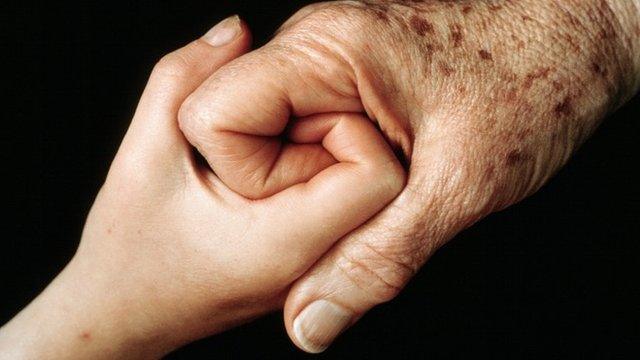Legal aid cut for family courts 'damaging' for children
- Published
This mother can't afford a lawyer and has to represent herself
Children are being damaged by the rising number of estranged couples representing themselves in family court battles, a former judge has claimed.
Following cuts to legal aid the number of people representing themselves in Wales nearly doubled in a year from 2,574 in 2012/13 to 4,920 in 2013/14.
Crispin Masterman said cases took longer to settle without solicitors.
The Ministry of Justice said it recommended mediation as "quicker, cheaper and less stressful" than court.
Family courts are private hearings dealing with financial issues, residence, and access for separated parents to their children, in front of a judge or magistrates.
The Legal Aid, Sentencing and Punishment of Offenders Act 2012 effectively removed legal aid for the majority of private family law cases when it came into effect in April 2013.
Judges, magistrates and lawyers have all criticised the new legislation, which they claim prevents vulnerable people from accessing justice, and slows up the family court system to the detriment of the children involved.
Only people who are proven victims of domestic violence, or those challenging care orders being imposed by local authorities through public law proceedings, remain eligible for legal aid.
More than half of all parties in the family courts were unrepresented by a solicitor, according to figures from the Ministry of Justice.
'Damaging' delays
Mr Masterman, who was a designated family judge for Cardiff and Pontypridd, told BBC Wales that the emotional, mental and psychological wellbeing of children involved in such cases risked being damaged by the court process.

Fewer lawyers means more family court hearings and longer delays, it is claimed
He said: "The Children Act says that the welfare of the child is paramount in these cases, which is a given. But it also says delay is the enemy of a child's best interests, and so anything which means that the resolution of a child's interests takes longer, must be damaging to the child."

'I just feel awful'
One mother who is representing herself in court against her ex-husband about access to their children said she has panic attacks because of the process.
"Usually about a week before we go to court, you feel sick, can't sleep, I have panic attacks, I have to take time off work because I don't want to go to work, I'm an emotional wreck. I'm low, I don't eat…I just feel awful.
"You walk in there, I've got no confidence at all…I don't know what to say, what the court procedure is, you just have to follow what they're doing and hope that one day I'll get listened to.
"I don't know much about the legal side of things, all the words or the swagger that they use, so it's very difficult to stand there knowing that he's got legal representation that's going to fight his corner and I'm just stood there on my own."

Mr Masterman said that taking lawyers "out of the equation" in most cases had meant more contested court hearings and longer delays in resolving cases.
He said: "The damage that's done is both emotional and probably, in some cases, psychological as well, and the difficulty is that parents don't see this, they're so tied up in their own issues that they forget that the child's welfare is the paramount issue."
Family law specialist Sophie Hughes warned that some children at the centre of complex cases could even end up in care.
She said: "One can only begin to think about the effect that it has on a child having parents who are spending months, years in some cases, litigating through the court about what the arrangement should be."
Mediation 'quicker'
A Ministry of Justice spokesperson said: "Since 2011 we have introduced major reforms to reduce delays further and to keep family disputes out of court.
"Mediation can be quicker, cheaper and less stressful than going through the confrontational experience of going to court.
"This is why legal aid for mediation remains available and why we have recently announced funding for free mediation sessions, as well as improving the advice and information available for couples who are separating."
The spokesperson added that information to help people representing themselves in court had been improved.
- Published16 July 2014

- Published1 May 2014
- Published13 March 2014

- Published20 March 2013
